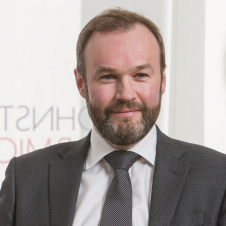Retire better: How do I do it?
This article originally appeared in The Scotsman on 3 September 2021.
Successful retirement planning should be based on the mantra ‘Review, review, review’ - to ensure you have enough money left to live the later life you want. Constant monitoring of your assets is vital to mitigate the financial risks of retirement, according to experts from Johnston Carmichael Wealth.
Ross Leckridge, a Chartered Financial Planner at Johnston Carmichael Wealth, was asked at the event 'Retire Better: How Do I Do It?' about the main risks people had to be aware of when planning their retirement.
“Running out of money is the biggest risk for most people,” he said. “That’s why I still talk to people about annuities. They’re not necessarily a popular option and have had a lot of bad press over recent years.
“However, the main benefit of annuities, in that they provide guaranteed income for life, means that they can still play an important part in a balanced retirement plan that offers both security and flexibility.”
Leckridge also highlighted inflation as a key risk. “People underestimate the effect of inflation,” he said. “If you sign up for something that will give you a fixed, non-increasing income for the rest of your life, that will reduce your buying power 20-30 years from now. So will holding lots of cash deposits where the interest rate is lower than inflation.”.
Investments were another risk, he said: “Investments don't always perform as you expect, but there's also sequencing risk, which is basically about the returns not happening at the times you want them to. If you’ve just retired and the market falls 30%, that has a completely different impact on your plan than the same 30% fall happening 15 years into retirement; it's about when the returns come, not just what the returns are.”.
The final risk highlighted by Leckridge was legislative change. “You could come up with a plan that works absolutely perfectly today and you've taken into account income tax rates, personal allowances, the inheritance tax nil rate band and all the rest of it. Then the Chancellor comes along and says ‘I'm changing tax rates, I'm getting rid of that allowance, putting up this rate over here’, and suddenly the plan doesn't quite work anymore. So legislative changes are a risk to your plan, because the goalposts can move after the plan is in place.”
The only way to approach this was to constantly review your plan, a point stressed by Leckridge’s colleague Stuart Walker, Head of Planning at Johnston Carmichael Wealth.
Walker urged people to think very carefully about what they wanted in retirement. Reliance on final salary pension schemes had diminished and individuals were clearly having to take much more responsibility.
“Living longer has had a big impact on retirement planning but it's less about life expectancy and more about what people expect from their lives in retirement,” he said. “Historically, it was always about age. You got to 60 or 65 and stopped working. Now it’s ‘Can I afford to retire?’ - and it’s about how you accumulate funds to create the retirement you want.”
“If you were fortunate enough, 10 years ago, you could put £255,000 in a tax year into your pension. That's down to £40,000, which is a huge drop. Also, what you can accumulate without a tax charge has reduced over the past 10 years with the Lifetime Allowance reducing from £1.8 million to just over £1 million.”
Walker said there was a huge amount of choice available in retirement planning and urged people to cut through the noise about all the options.
“Be very careful to try and navigate through the noise and make the best decisions for you and your family. Take control, make a plan, and ensure you keep reviewing that plan on a regular basis. Plan, review - and keep reviewing.”
Walker described the huge changes in the pensions landscape, from annuities to pensions 'simplification’ and flexible drawdown in 2006 and then ‘pension freedom’ in 2015, which opened up the opportunity to draw down pensions income when and how you wished.
He said this meant advisers often had to “save clients from themselves” by ensuring they didn’t deplete pension pots too quickly. However, there were significant benefits too, he stressed: “The changes to pension death benefits were a huge positive for our clients and changed the way we advised them. A lot of our clients are spending non-pension assets first and leaving the pension to last because of the tax advantages of using pensions to pass capital down to the next generation.”

Kirsti Macdonald, a Technical Specialist with Johnston Carmichael Wealth, said pre-retirement planning was a “lifelong process”. She added: “It’s never too early to start. The more prepared you are, the better chance you have of success in retirement, and the more prepared you'll be for potential pitfalls, like running out of money. You should know your personal and financial situation well enough to have a plan B in place.”
“Pre-retirement planning involves clearly identifying what you expect you’ll need money for (food, bills, etc) alongside what you want money for (holidays, eating out, etc). Once you know what you want to achieve, we can start to work backwards and determine whether you will have enough, or need to take additional steps to get there.”
Macdonald highlighted research showing that 77% of savers don't actually know how much they need to fund their desired lifestyle in retirement*, “which is frightening considering running out of money is our greatest financial risk in life.”
Rory Brand, a Financial Planner with Johnston Carmichael Wealth, highlighted a constant factor throughout radical pension changes: “One thing that stays the same is taxation. So once you're past your tax-free cash, if you get income from an annuity, you'll be taxed on it. Drawdown is slightly different, and you've got options. You can take your tax-free cash bit by bit, or all up front. But anything which isn't your tax-free cash will still be taxable. It's just about making sure whatever you do suits your needs.”
When clients wanted to draw down from their pensions, Brand said, he always asked them why. One frequent answer was to spend on a particular purchase, be it a car or renovation etc. “My follow-up question is well, actually, do you have other capital that you could use for that?”
He added: “If you're going to take tax-free cash, make sure you know why it makes sense, that your investment options are right for now, but also right for your [long-term] plan.
“Retirements can last 40 years - your life will change, legislation will change, investments will change. So review, and don't just review once, it has to be periodical. Review, review, review.”
People underestimate the effect of inflation. If you sign up for something that will give you a fixed, non-increasing income for the rest of your life, that will reduce your buying power 20-30 years from now.
Ross Leckridge
Chartered Financial Planner, Johnston Carmichael Wealth
Ross Leckridge urged anyone planning for retirement to think about exactly what they wanted, then create a structured plan: “Grab a piece of paper, or spreadsheet, or download the latest money app - and jot down your capital needs, income needs, and other needs.”
Capital needs might include paying off your mortgage, or giving a gift to your children - and thinking about where you want to live.
Income needs are basic living expenses plus lifestyle costs, such as holidays, hobbies and socialising. ‘Other’ might be the desire to leave a legacy, to children, grandchildren or a charity.
Leckridge said people should then look at what guaranteed income (final salary pensions and the state pension), regular income (such as rental income from property or dividends from businesses) and assets, like savings, premium bonds and share portfolios, they will have.
Then, he said, they should ask: Does my plan work?
If it isn’t working, he said, you might need to reconsider your spending: “You've said you're going to give these gifts to the kids, but are you prepared to do that at the cost of your own lifestyle? Or do you need to use resources differently? If the plan was based on taking maximum pension and no tax-free cash, what if you flip that - and take maximum tax-free cash and a smaller pension? Does that plug the gap sufficiently to make it work?
The final option was working longer: “That will give you less years of drawing down on assets you've built up because you're living off earnings for longer, and also give you longer to build up those savings and assets to help them last when you do finally retire - but it's not popular!”
* Source ‘Retirement Living Standards’ by Pensions and Lifetime Savings Association.
Johnston Carmichael Wealth are authorised and regulated by the Financial Conduct Authority.
Copyright of The Scotsman Publications Ltd.
